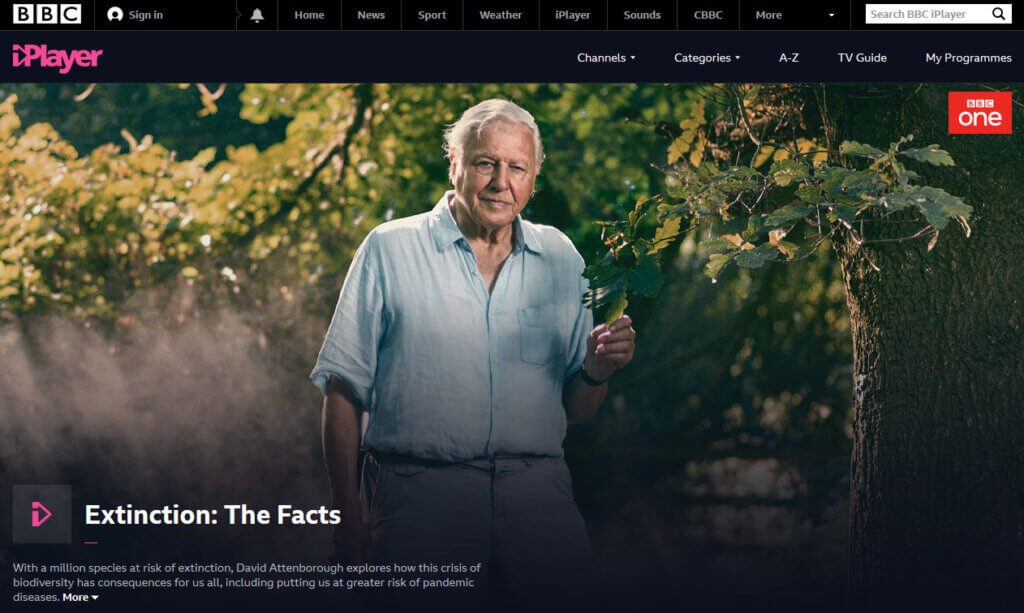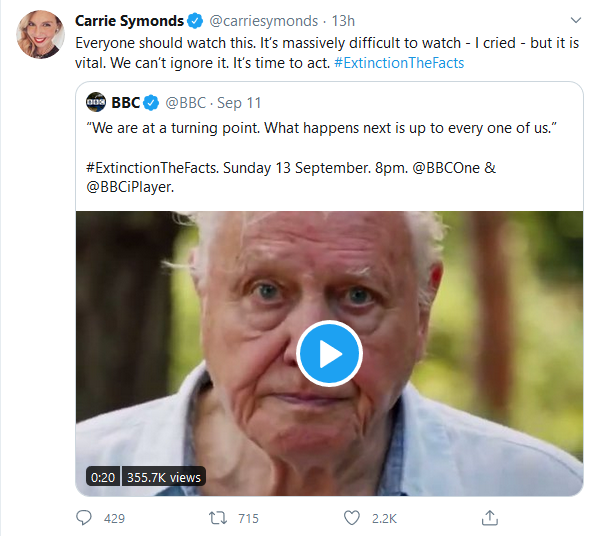
Did you watch this yesterday evening? I did and I was a bit disappointed by it until it got onto the current and other pandemics.
Yes the early part of the programme was interesting and beautifully filmed but there were rather too many talking heads whose soundbites were bookended by stunning or disturbing imagery. The argument didn’t hang together very well, except to the already-converted, and the programme wasn’t grabbing me. But when we turned to the link between habitat destruction, wet markets, global trade and pandemics then it did grab me. I knew something of these arguments, and was vaguely persuaded by them already, but somehow, for me, everything clicked into place in the second half of the programme.
There were some impressive interviewees such as Nick Stern, Partha DasGupta, Bob Watson, Toby Gardner, Felicia Keesing and Dan Pauly (hmmm – they are mostly men – but they are the ones I remember best).
Will this programme make any difference? The BBC shies away from having a quick ’10 things you can do to make things better’ bit or the ‘David Attenborough guide to saving the planet’s wildlife’ and that means that the audience is left slightly all revved up with nowhere to go. And then it was the last episode of Strike: Lethal White and we forgot all about saving the planet for a detective story (quite a good one).
But we can only hope that those with the greatest power to face up to the facts will not turn their backs on them.


The BBC are really good on spectacle not so good on solutions not associated with the market. I can’t see them giving much room to anything beyond electric cars and ‘technology will save us’ type solutions. Their income and bloated salaries depend upon it. I’d still recommend reading BBC: Myth of a Public Service by Tom Mills before being disappointed by the Beeb.
Bruce Parry after all his time spent in remote parts of the world had an outline for a BBC series on how our consumption was linked to the destruction he’d witnessed there. This is exactly what a public service broadcaster should have been interested in – they turned him down. Even environmental groups have shrank back from asking people to make changes to how they live – the emphasis is now on petitions and barracking politicians to change the system rather than take personal responsibility. Although no longer an angler I still occasionally watch fishing videos. I was a bit nonplussed to see that some companies are now using rosewood, a tropical hardwood, as part of their reel handles. In itself not exactly a massive contributor to deforestation, but this is going in exactly the wrong direction from the one we once were taking – in the late eighties, early nineties this wonderfully would have been practically sacrilegious.
We have a massive recycling infrastructure which should be making a difference, but it’s under and very badly used while virtually nothing is done to link it to saving the natural world. If you read this please take a moment to think what your local authority has told you about how your kerbside recycling system saves wildlife – see what I mean, it hasn’t has it? Informed consumer choice would make a huge difference, but I’ve had people in the Green Party tell me it’s irrelevant the whole system has to change. I can’t see why it has to to stop us using virgin fibre for toilet rolls, or conversely if the military industrial complex did surrender to global green socialism that would automatically be accompanied by an upsurge in the sale of recycled bog roll. A lot of little and not so little steps we could be taking, but aren’t.
How would you solve the problem of the small cetacian confined to the Sea of Cortez? At the moment the market indicates (or perhaps dictates) that the species will go extinct. Their existence is not of primary importance to ‘the market’.
It would require legislation, local enforcement and international agreements and internaitonal enforcement. Perhaps even the BEEB have yet to gain that level of control. You may be chasing shadows.